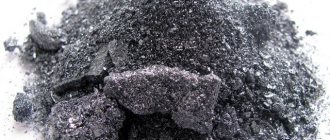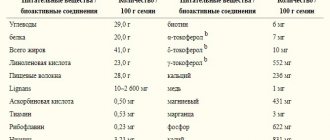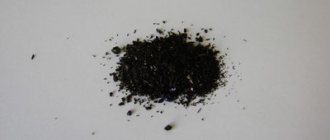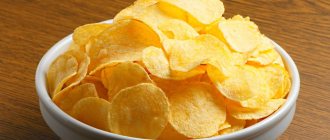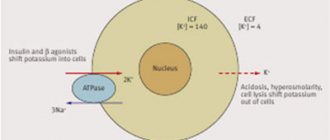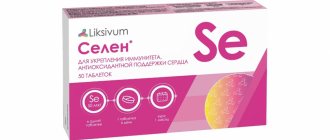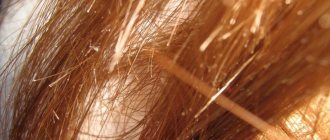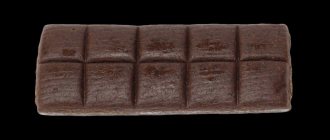Description of the substance
Potassium iodide is a compound of inorganic iodine. It consists of colorless or white crystals, as well as a powder of small crystals. It has no odor and tastes bitter and salty.
Potassium iodide is included in many drugs and dietary supplements; eye drops with an antiseptic effect and a solution for oral administration are produced. Basic tablets with potassium iodide: Iodomarin, Potassium iodide, Yodilife, Microiodide. They are produced with a dosage of 100 or 200 mcg of the main substance.
POTASSIUM IODIDE. Kalii iodidum.Synonym: potassium iodide.
Properties.
Potassium iodide is colorless or white cubic crystals or white fine-crystalline powder, odorless, salty-bitter taste, easily soluble in water and alcohol. Hygroscopic, becomes damp in humid air, photosensitive, incompatible when used with copper sulfate (an insoluble compound is formed - copper iodide). The iodine content in 1 g of potassium iodide is 764 mg.
Release form. The drug is available in powder, tablets containing 0.5 g of potassium iodide and 0.005 g of potassium carbonate, and kiode tablets. The drug is packaged in glass jars with a ground stopper made of orange glass, wrapped in light-proof paper. Packaged in 0.1; 0.25; 1 and 5 kg.
Store in dry and covered warehouses. Transported by all means of transport in accordance with the rules for the carriage of goods. Guaranteed shelf life is 3 years from the date of manufacture.
Action and application.
After oral administration, potassium iodide is easily absorbed and decomposes to form free iodine, which is a necessary element for the animal body. Iodine is part of the thyroid hormone - thyroxine, which activates redox processes in cells, increases the activity of many enzymes (cytochrome oxidase, xanthine oxidase, arginase, oxidase, alkaline phosphatase, etc.), regulating all types of metabolism in the body and the functional activity of the genital organs .
Lack of iodine causes hyperplasia of the thyroid epithelium and the development of goiter, disturbances in nitrogen, carbohydrate, lipid and mineral metabolism in the body, a decrease in the amount of thyroid-stimulating and luteinizing hormones in the pituitary gland and sexual dysfunction, stillbirths and abortions, decreased fertility, fertility and productivity, growth retardation and animal development.
Potassium iodide belongs to the group of drugs of moderate toxicity.
The slaughter of animals for meat when using potassium iodide is not limited. Milk is used on a general basis.
Potassium iodide is used in animals to prevent iodine deficiency due to iodine deficiency in feed and water. It is added to the composition of premixes and mineral mixtures, while calcium stearate is used as an iodine stabilizing substance in an amount of 10% of the mass of potassium iodide. Premixes are introduced into mixed feed, and mineral mixtures are constantly fed along with concentrates, silage, haylage, green mass, table salt and mineral additives.
Potassium iodide is also prescribed separately from salts of other microelements in the form of aqueous solutions, and it is also included in the preparation kayod.
Iodine standards for all types of animals are 0.3-0.6 mg/kg of dry matter of the diet.
Depending on the level of iodine deficiency (25-75% deficiency of the daily requirement), potassium iodide is administered orally
in the following prophylactic doses (mg per animal).
Animal species
| Iodine norm | Drug dose | |
| Stud bulls | 3,8-7,5 | 1,85-5,55 |
| Dairy cows | 5-12 | 2,77-8,31 |
| Dry cows | 3,6-7,2 | 1,77-5,31 |
| Calves up to 6 months | 0,8-1,5 | 0,37-1,11 |
| Young animals over 6 months | 1,6-2,5 | 0,67-2,01 |
| Pregnant sows up to 2 years | 0,9 | 0,3-0,9 |
| Pregnant sows over 2 years old | 1,5 | 0,5-1,5 |
| Sows suckling | 1,2-1,8 | 0,5-1,5 |
| Piglets weighing from 5 to 20 kg | 0,05-0,5 | 0,09-0,27 |
| Piglets weighing from 21 to 50 kg | o;o-o,8 | 0,23-0,69 |
| Fattening pigs, from 51 to 75 kg | 1 | 0,32-0,96 |
| Fattening pigs from 76 to 100 kg | 1,6 | 0,52-1,56 |
| Adult sheep | 0,35-0,65 | 0,17-0,51 |
| Sheep suckling | 0,65-1,1 | 0,28-0,84 |
| Lambs up to 6 months | 0,2-0,4 | 0,1-0,3 |
| Lambs over 6 months | 0,25-0,5 | 0,12-0,36 |
If there are clinical signs of iodine deficiency, the drug is used for 10-15 days in therapeutic doses, 2 times higher than prophylactic doses, and then given in prophylactic doses constantly once a day, adjusting the doses depending on the iodine content in feed and water.
Potassium iodide is used as a specific agent for actinomycosis and botryomycosis in cattle daily for 8-14 days, 2 g per 100 kg of animal weight in the form of aqueous solutions. Iodine is retained in the foci of the pathological process and promotes rapid resorption of inflammatory products and neutralization of under-oxidized metabolic products.
Potassium iodide is prescribed orally to birds for feather loss and apteriosis at a dose of 3-4 mg per head. For preventive purposes, it is used with drinking water at the rate of 50-80 mg of the drug per 10 liters of water.
Personal preventive measures: when preparing premixes and mineral mixtures, it is necessary to work in safety glasses and respirators.
How it affects the body
The main purpose of the substance is to replenish iodine deficiency. It also has expectorant, antifungal, radioprotective, antithyroid and mucolytic effects.
After entering the body in the dosages recommended for iodine deficiency, it normalizes the production of thyroid hormones. When taken in higher doses due to hyperfunction of the thyroid gland, its hormonal activity is suppressed.
Iodide also helps stop the growth of the thyroid gland, reduce its size, prevents enlargement of the thyroid gland and brings the size to normal in adolescents and children.
In patients diagnosed with hyperthyroidism, it effectively alleviates symptoms, so potassium iodide is prescribed in preparation for surgery to remove part of the thyroid gland. The effect of suppressing hormonal activity lasts from 14 to 21 days.
The substance can also prevent the thyroid gland from absorbing radioactive isotopes of iodine, thereby protecting the body from radiation exposure.
Potassium iodine promotes expectoration, as the substance is released with bronchial mucus, thins sputum and facilitates coughing.
Why take potassium iodide?
According to the instructions for drugs based on potassium iodide, the general purposes of their administration can be identified:
- prevention of diseases associated with insufficient intake of iodine into the body in those regions where its deficiency is recorded;
- prevention of pathologies of the thyroid gland (goiter) in pregnant women, nursing mothers, children, adolescents;
- therapy for enlarged thyroid gland and other diseases caused by iodine deficiency in patients of different age categories (including children from birth);
- prevention of re-growth of the thyroid gland after removal of part of it;
- treatment of hyperfunction of the thyroid gland, preoperative preparation for removal of a fragment of the thyroid gland;
- help with difficulty with sputum discharge (with inflammatory diseases of the respiratory system, bronchial asthma, fungal infection of the lungs).
It is prescribed as an auxiliary medicine in the tertiary period of syphilis, as it promotes the resorption of infiltrates.
Also, drugs based on potassium iodide are prescribed for protection against radiation.
The substance in the form of drops is used in ophthalmology - for the treatment of cataracts, hemorrhages in the eye membranes, clouding of the cornea, fungal infections of the outer mucous membrane of the eye and cornea.
Dentists prescribe it for inflammation of the salivary glands and dry mouth due to insufficient saliva production.
Benefits and harms
Potassium iodate in moderate quantities is not hazardous to health, provided that the substance is highly purified.
High doses of the product negatively affect the functioning of the digestive system and cause irritation of the mucous membranes. In individual cases, allergic reactions are observed in the form of a rash, increased body temperature, and nausea.
Salt enriched with potassium iodate is contraindicated in the following conditions:
- thyroid cancer;
- kidney diseases;
- tuberculosis;
- hemorrhagic diathesis;
- some skin diseases (for example, urticaria).
The carcinogenic properties attributed to potassium iodate have not been officially confirmed.
When is potassium iodide contraindicated?
Medicines and dietary supplements are not prescribed or taken independently in case of increased sensitivity to iodine.
Contraindications also include:
- increased activity of the thyroid gland, which can be obvious or hidden;
- benign thyroid tumors for dosages of more than 300 mcg per day (nodular goiter, adenoma);
- Dühring's disease;
- glomerulonephritis;
- dystrophic changes in the kidneys;
- pulmonary form of tuberculosis.
For hyperthyroidism, you can take medications only during preparation for surgery.
Excerpt describing Potassium Iodide
“No, no, and a thousand times no, I will never agree with you,” said Pierre. In the evening, Prince Andrei and Pierre got into a carriage and drove to Bald Mountains. Prince Andrei, glancing at Pierre, occasionally broke the silence with speeches that proved that he was in a good mood. He told him, pointing to the fields, about his economic improvements. Pierre was gloomily silent, answering in monosyllables, and seemed lost in his thoughts. Pierre thought that Prince Andrei was unhappy, that he was mistaken, that he did not know the true light, and that Pierre should come to his aid, enlighten him and lift him up. But as soon as Pierre figured out how and what he would say, he had a presentiment that Prince Andrei with one word, one argument would destroy everything in his teaching, and he was afraid to start, afraid to expose his beloved shrine to the possibility of ridicule. “No, why do you think,” Pierre suddenly began, lowering his head and taking on the appearance of a butting bull, why do you think so? You shouldn't think like that. - What am I thinking about? – Prince Andrei asked in surprise. – About life, about the purpose of a person. It can't be. I thought the same thing and it saved me, you know what? Freemasonry No, don't smile. Freemasonry is not a religious, not a ritual sect, as I thought, but Freemasonry is the best, the only expression of the best, eternal sides of humanity. - And he began to explain Freemasonry to Prince Andrey, as he understood it. He said that Freemasonry is the teaching of Christianity, freed from state and religious shackles; teachings of equality, brotherhood and love. – Only our holy brotherhood has real meaning in life; “everything else is a dream,” said Pierre. “You understand, my friend, that outside of this union everything is full of lies and untruths, and I agree with you that an intelligent and kind person has no choice but to live out his life, like you, trying only not to interfere with others.” But assimilate our basic beliefs, join our brotherhood, give yourself to us, let us guide you, and now you will feel, as I did, part of this huge, invisible chain, the beginning of which is hidden in the heavens,” said Pierre. Prince Andrey, silently, looking ahead, listened to Pierre's speech. Several times, unable to hear from the noise of the stroller, he repeated the unheard words from Pierre. By the special sparkle that lit up in the eyes of Prince Andrei, and by his silence, Pierre saw that his words were not in vain, that Prince Andrei would not interrupt him and would not laugh at his words.
Possible negative effects from taking
As a rule, preparations with potassium iodide are well tolerated. The instructions contain the following warnings:
- when taken, reactions from the gastrointestinal tract may occur - attacks of nausea and vomiting, diarrhea, abdominal or stomach pain;
- from the central nervous system - anxiety and headache may appear;
- Allergy manifestations are possible - hemorrhages on the mucous membranes and skin, swelling of the salivary glands, angioedema, urticaria.
Overdose
If the recommended dose is greatly exceeded, death is possible. It is necessary to strictly follow the instructions for use of the drug. Symptoms of acute overdose include: collapse, brown discoloration of the oral mucosa, anuria (lack of urine flow into the bladder), rhinitis, bleeding from the urinary tract, bronchitis, swelling of the vocal cords, gastroenteritis. Overdose is treated as follows:
- Gastric lavage with a solution of sodium thiosulfate (1%) and starch.
- Taking a thick broth (corn, oatmeal, rice or potato), porridge made from flour.
- Symptomatic and supportive therapy.
Use in special categories of patients
Potassium iodide is allowed in preventive dosages for pregnant women, as well as women during lactation.
Exceeding the dosage prescribed by the doctor may inhibit thyroid function, but increase the size of this organ in the fetus.
If it is necessary to take doses exceeding 300 mcg of iodine per day, then breastfeeding must be stopped. Otherwise, the child may develop a rash and the activity of the thyroid gland will decrease.
In children, as prescribed by a doctor and depending on the dosage form, it is used from birth. Eye drops are used only in adults.
Application options, dosage regimens
Products with potassium iodide can be used in two ways - orally and by instillation into the eyes.
The tablets are taken orally after meals, washed down with water:
- for the prevention of nodular formations in the thyroid gland in adults and children over 12 years of age: 100 or 200 mcg per day once; children under 12 years old - 50 or 100 mcg per day; the appointment may be for life;
- for the treatment of nodular neoplasms in adults - from 200 to 600 mcg per day; children from birth to 18 years - from 50 to 200 mcg per day; Treatment courses are long and range from six months to one year.
To thin sputum, take a 1-3% solution of potassium iodide, two to three tablespoons three to four times a day. For tertiary syphilis - one tablespoon of a 3% solution three times a day.
In order to protect against radiation - children from two years of age and adults - 0.125 g once a day, children under two years old - 0.04 g once a day.
For hyperthyroidism - 250 mcg three times a day.
In ophthalmic practice, special eye drops are used: two drops are instilled into each eye three or four times a day. The duration of the procedures is 10-14 days.
